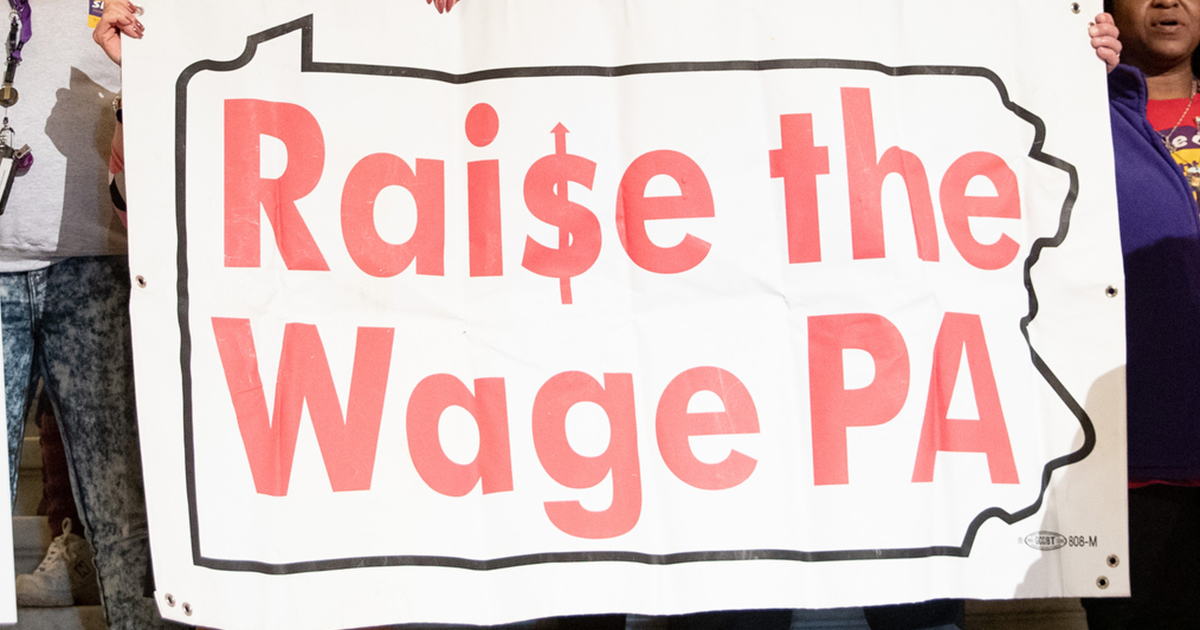
Senator Tartaglione Introduces Legislation to Raise Pennsylvania’s Minimum Wage
Crafted in partnership with Governor Wolf, Senate Bill 12 would raise the minimum wage to $12 this year and $15 by 2025, followed by annual cost of living increases.
HARRISBURG, PA, Marzo 22, 2019 – State Sen. Christine M. Tartaglione (D-Philadelphia) today introduced Senate Bill 12 that would raise Pennsylvania’s minimum wage to $12 per hour this year, and $15 by 2025, after which the rate would be adjusted automatically each year based on a cost of living index. The measure would directly impact about 1 million Pennsylvania workers in 2019.
Senator Tartaglione crafted the bill in partnership with Governor Tom Wolf. The legislation has been referred to the Senate’s Labor & Industry Committee, of which Senator Tartaglione serves as minority chairwoman.
“It’s been 13 years since Pennsylvania last raised its minimum wage and this raise is long overdue,” Senator Tartaglione said. “All six of our neighboring states have raised their minimum wages above the federal minimum, as have 29 states across the nation. Pennsylvania’s minimum wage has stagnated as the cost of living and worker productivity have soared throughout the Commonwealth and the around the country, and while income inequality has reached an all-time high.”
Pennsylvania’s minimum wage stands at $7.25 per hour, which is also the federal minimum. S.B. 12 calls for employers to pay workers at least $12 per hour starting on Julio 1, 2019. The minimum wage will increase by 50 cents each ensuing Julio 1 until reaching $15 in 2025. Starting on Julio 1, 2026, and each succeeding Julio 1 thereafter, the minimum wage would increase in proportion with the Consumer Price Index for All Urban Consumers for the Pennsylvania, New Jersey, Delaware, and Maryland area.
In addition, the legislation would eliminate the sub-minimum wage for tip earners, workers with disabilities, apprentices, and students. It would eliminate the preemption on municipal wage ordinances, expand the powers of the Department of Labor & Industry to recover wages and penalties for violations of the Minimum Wage Act, increase monetary penalties for violations, and bring enforcement in line with the nation’s Fair Labor Standards Act.
Due to inflation, the minimum wage has lost 29 percent of its earning power over the last 50 years. At $7.25 per hour, a full-time, year-round worker would earn just $15,080 per year, which is below the federal poverty level for a two-person household, such as the single parent of an only child. Data show that most of Pennsylvania’s low-wage workers are women and age 20 or older. Low-wage workers contribute more than half of the average family income in Pennsylvania.
“Vital members of our community, such as child care and home health workers, bank tellers, construction workers, retail and hospitality workers who work full-time while making the minimum wage only earn about $15,000 a year,” Senator Tartaglione said. “They cannot afford basic necessities such as rent, transportation, food, and prescriptions. Many are forced to rely on public assistance to get by. The inability for hard-working people to care for their basic needs, or those of their families, is morally wrong and is economically unsound.”
# # #
Si desea más información sobre este tema, póngase en contacto con William Kenny en el 215-533-0440 o por correo electrónico en [email protected].
Senator Tartaglione Senate Floor Remarks on Raising the Minimum Wage
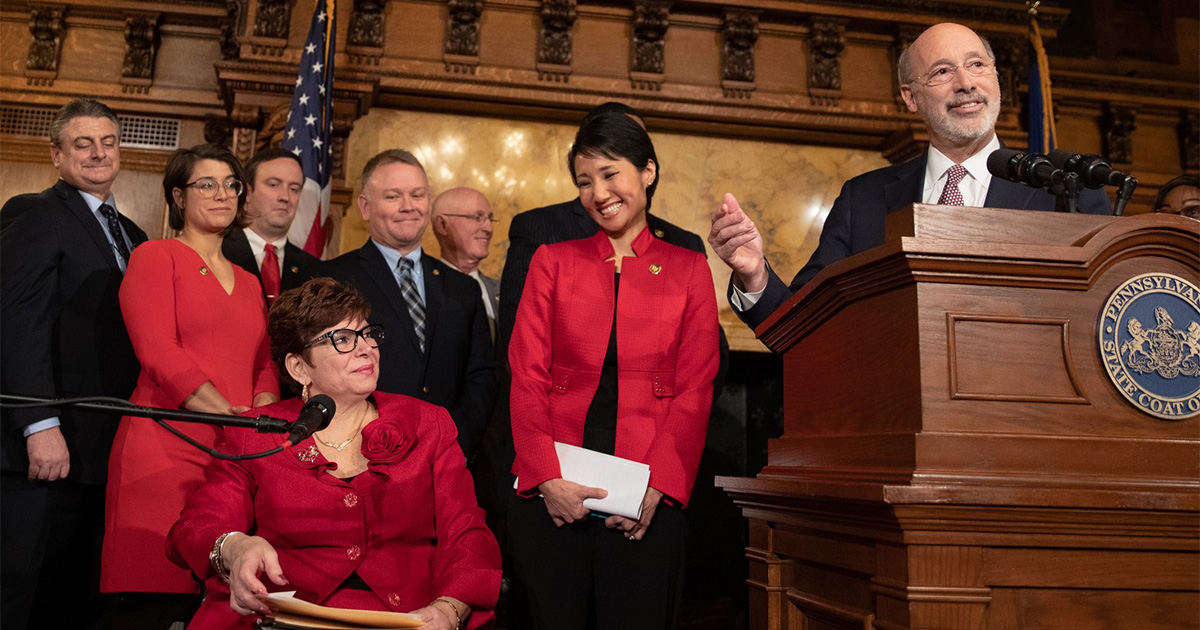
Más de tres docenas de economistas respaldan el plan de Tartaglione para aumentar el salario mínimo en Pensilvania
En una carta publicada hoy, 38 investigadores y analistas coinciden en que ha llegado el momento de un "aumento audaz" de un salario mínimo que lleva estancado más de una década.
FILADELFIA, PA, 13 de marzo de 2019 - La propuesta de salario mínimo de $15 elaborada por la senadora estatal Christine M. Tartaglione(D-Filadelfia) en colaboración con el gobernador Tom Wolf ha obtenido el respaldo de 38 economistas y científicos sociales, que han firmado conjuntamente una carta en la que piden un aumento audaz del obsoleto salario mínimo de Pensilvania.
Los investigadores y analistas económicos representan a instituciones académicas de toda la Commonwealth y de todo el país, así como al Economic Policy Institute, con sede en Washington D.C., y al Keystone Research Center, con sede en Harrisburg, que han publicado hoy la carta. El texto completo de la carta y sus signatarios puede consultarse en www.keystoneresearch.org.
"Han pasado 13 años desde que la Commonwealth subió por última vez su salario mínimo y una década desde que el gobierno federal promulgó su ajuste salarial mínimo más reciente. Mientras tanto, los salarios de los ejecutivos han seguido disparándose, la clase media ha seguido reduciéndose y la desigualdad de ingresos ha alcanzado un máximo histórico. Todo esto ha sucedido mientras la productividad de los trabajadores alcanzaba cotas sin precedentes", declaró el senador Tartaglione. "Trece años es demasiado tiempo para esperar un aumento".
El senador Tartaglione presentará en breve el proyecto de ley 12 del Senado, que elevaría el salario mínimo de Pensilvania de 7,25 dólares por hora a 12 dólares este año, seguido de aumentos anuales de 50 céntimos hasta alcanzar los 15 dólares en 2025.A partir de entonces, el salario mínimo se vincularía a los ajustes anuales automáticos del coste de la vida. La legislación también eliminaría el salario mínimo inferior, que permite a las empresas pagar tan sólo 2,83 dólares por hora a determinadas categorías de trabajadores, como los que reciben propinas, los discapacitados, los becarios y los estudiantes.
Los economistas afirmaron que la nueva propuesta de salario mínimo aumentaría directamente los salarios de 1,5 millones de ciudadanos de Pensilvania en 2025, además de otros 500.000 que ganan ahora poco más de 15 dólares y que probablemente recibirían un aumento de sueldo cuando sus empleadores ajusten las escalas salariales internas. Ajustados a la inflación, los trabajadores con salario mínimo de Pensilvania ganan hoy un 29% menos por hora que sus homólogos de hace 50 años, aunque la productividad de los trabajadores se ha duplicado en Pensilvania en ese tiempo.
"La gran mayoría de los empleados que se beneficiarían son adultos -desproporcionadamente mujeres- de familias trabajadoras, que trabajan al menos 20 horas semanales y dependen de sus ingresos para llegar a fin de mes", escribieron los economistas.
Además, los economistas afirmaron que el "peso de la evidencia" de la "investigación académica rigurosa" ha demostrado que los aumentos medidos del salario mínimo en otros lugares han tenido "poco o ningún efecto negativo" en la situación laboral de los trabajadores con salarios bajos. Por el contrario, los aumentos para dos millones de habitantes de Pensilvania supondrían 6.500 millones de dólares en salarios más altos, lo que beneficiaría a sus familias y a las comunidades en las que viven, incluidas las empresas locales.
"Es hora de apoyar un aumento audaz del salario mínimo en Pensilvania para abordar el hecho de que nuestros salarios para los trabajadores en el extremo inferior del mercado laboral han seguido estancados, y para ayudar a revertir décadas de creciente desigualdad salarial", afirma la carta.
"Estos economistas están a la vanguardia de la investigación sobre el tema. Acojo con satisfacción su apoyo a mi plan y su reafirmación de que Pensilvania debe actuar ahora para aumentar el salario mínimo. Hace tiempo que debería haberse hecho", dijo el senador Tartaglione.
# # #
Si desea más información sobre este tema, póngase en contacto con William Kenny en el 215-533-0440 o por correo electrónico en [email protected].
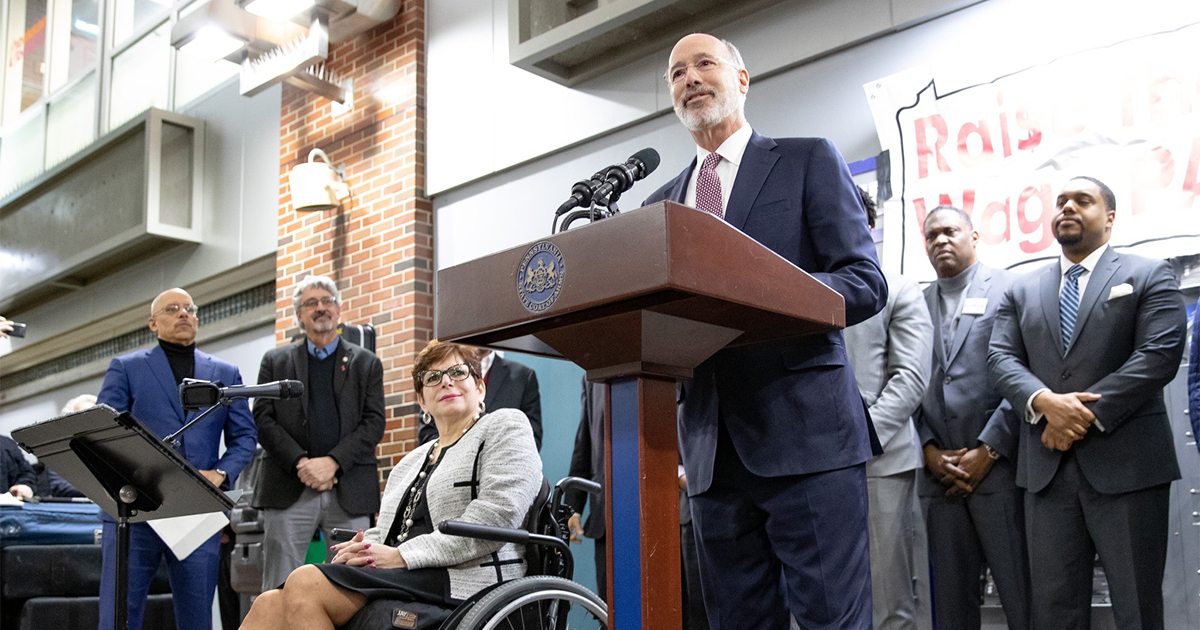
Sen. Tartaglione, Gov. Wolf Lead Rally for Long-Overdue Raise to Pennsylvania’s Minimum Wage
Philadelphia Mayor Jim Kenney, numerous elected officials, labor leaders, and commuters gathered at Frankford Terminal to join the call for a living wage
PHILADELPHIA, PA, Febrero 8, 2019 – State Sen. Christine M. Tartaglione (D-Philadelphia) and Pennsylvania Gov. Tom Wolf led a coalition of elected officials, labor leaders, worker advocates, and commuters at the bustling Frankford Transportation Center today to rally support for a long overdue raise in Pennsylvania’s minimum wage.
It’s been 13 years since the legislature last raised the state’s minimum wage, and a decade since the federal government’s last minimum wage increase. Pennsylvania workers have been subject to a $7.25 minimum wage since then. At that rate, a 40-hour-per-week worker would earn just $15,080 per year. That’s barely above the federal poverty level for an individual, and about $1,400 below the poverty level for a two-person household.
“Let’s be clear about the people who we’re going to help by raising the minimum wage,” Sen. Tartaglione said. “It’s not just the teenagers who work at fast food restaurants, convenience stores, and other part-time, entry level jobs. The overwhelming majority of those who would see their paychecks get bigger – 90 percent in fact – are in their 20s or older. And half of them are full-time workers. On average, these folks earn more than half of their family’s total income.”
Numerous elected officials joined Tartaglione and the governor for the high-energy rally, including Philadelphia Mayor Jim Kenney and Tartaglione’s Senate colleagues Vincent Hughes, Art Haywood, and Tim Kearney. Wolf and Tartaglione each detailed the minimum wage proposal that the senator will soon introduce as Senate Bill 12.
“Twenty-nine states and the District of Columbia have raised their minimum wages above the federal minimum. New raises took effect in 18 states just last month,” Sen. Tartaglione said.
The legislation would raise the minimum wage from $7.25 to $12 this year, followed by annual increases of 50 cents until it reaches $15 in 2025. After then, the minimum wage would be adjusted annually, automatically, based on the cost of living. The legislation would also create safeguards to protect workers from employers who willfully underpay.
“I’ve said it before, I’ll say it today, and I’ll keep saying it – it’s past time that we raise the wage in Pennsylvania,” Gov. Wolf said. “Pennsylvania must be a place where hard work is rewarded, but our minimum wage hasn’t changed in a decade and too many hardworking people are struggling to get by. We must raise the wage.”
Raising the minimum wage to $12 this year would directly benefit more than one million workers, most of whom make more than the current minimum wage, but less than $12.
“This raise would put more money into their pockets, helping them to pay their bills,” Sen. Tartaglione said. “And it would inject billions of consumer dollars into our economy.”
# # #
If you would like more information about this topic, please contact William Kenny at 215-533-0440 or email at [email protected]

Sen. Tartaglione Joins Gov. Wolf to Announce New Plan to Raise Pennsylvania’s Outdated Minimum Wage
In collaboration with the governor and state Rep. Patty Kim, the senator will introduce legislation that will directly help more than one-third of Pennsylvania’s workers.
HARRISBURG, PA, Enero 30, 2019 – State Sen. Christine M. Tartaglione (D-Philadelphia) today joined Gov. Tom Wolf, state Rep. Patty Kim, many of their legislative colleagues, and many worker advocates to announce their plan to raise Pennsylvania’s outdated minimum wage, which has stagnated at just over $7 per hour for the last 12 years.
Under the new proposal, Pennsylvania’s minimum wage would rise from the federal minimum of $7.25 to $12 on Julio 1, 2019. It would then increase an additional 50 cents per year until reaching $15 in 2025, after which it would be linked to annual cost of living adjustments. Tartaglione will soon introduce this plan as legislation in the Senate, while Kim will introduce it in the House.
“Minimum wage is one of the most important issues facing us as elected officials and as a Commonwealth because it directly impacts so many of our constituents. Enacting our legislation would give raises to 2.1 million Pennsylvanians, who represent 37 percent of the total workforce,” Sen. Tartaglione said, quoting data compiled by the Keystone Research Center.
Inflation has grown by more than 20 percent nationwide in the last dozen years, according to the Bureau of Labor Statistics, and 29 states, along with the District of Columbia, have raised their minimum wages above the federal minimum – including California and Washington at $12, and New York at $11.10.
New minimum wage raises took effect in 21 states this month, and New Jersey lawmakers are planning to vote tomorrow on a plan to raise that state’s minimum wage to $15 over the next five years. All six of Pennsylvania’s neighboring states have higher minimum wages than the $7.25 in effect throughout the Commonwealth.
 “Raising the Minimum Wage is long overdue. I know this because I sponsored Pennsylvania’s last successful Minimum Wage legislation in 2006,” Sen. Tartaglione said. “At the time, all the naysayers warned us that we would force Pennsylvania companies out of business and drive away countless jobs. These doomsday predictions never came to pass. Undaunted, our critics are making the same argument now. — that businesses can’t afford to pay a fair minimum wage, A LIVING WAGE!”
“Raising the Minimum Wage is long overdue. I know this because I sponsored Pennsylvania’s last successful Minimum Wage legislation in 2006,” Sen. Tartaglione said. “At the time, all the naysayers warned us that we would force Pennsylvania companies out of business and drive away countless jobs. These doomsday predictions never came to pass. Undaunted, our critics are making the same argument now. — that businesses can’t afford to pay a fair minimum wage, A LIVING WAGE!”
“(Pennsylvania) workers and their families would earn an additional $9.1 billion over five years, money that they will spend in their communities in support of businesses,” Senator Tartaglione said. “This new prosperity would benefit people from all walks of life – all ages, all races, all religions, and both women and men. It would help workers in our major cities, those who live in the suburbs, and our rural workforce.”
Wolf stated that raising the minimum wage would reduce demand for public assistance and save taxpayers a combined $155 million over the next two years. Nearly 17,000 people would leave the state-funded Medicaid program next year, and another 51,000 would leave the following year. A portion of that savings will be reinvested to raise wages for workers who provide Department of Human Services-supported childcare and home care for seniors and people with disabilities.
“Pennsylvania must be a place where hard work is rewarded. But our minimum wage hasn’t changed in a decade and too many hardworking people are struggling to get by,” said Governor Wolf. “Raising the minimum wage lets people afford the basics, like food, rent and transportation.
“It also lets people work their way off of public assistance rather than having taxpayers subsidizing employers that are paying poverty wages. One fair wage saves tax dollars, grows the middle class and creates new customers for businesses, which benefits all of us.”
# # #
Si desea más información sobre este tema, póngase en contacto con William Kenny en el 215-533-0440 o por correo electrónico en [email protected].
Sen. Tartaglione Joins Gov. Wolf to Announce New Plan to Raise Minimum Wage
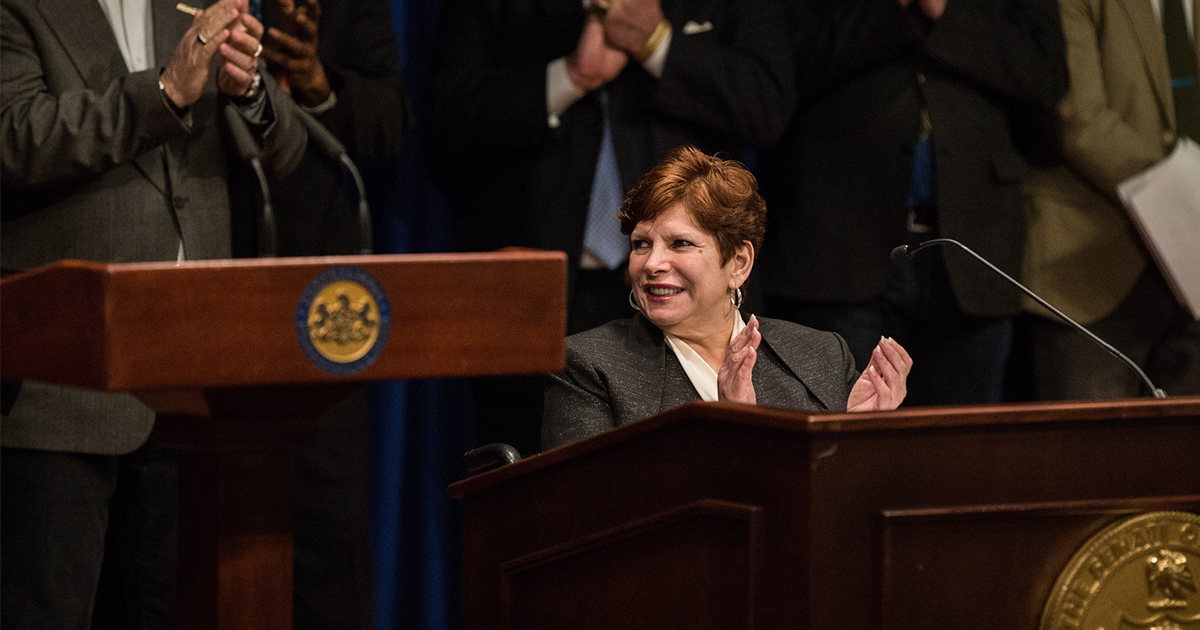
Tartaglione Applauds Governor’s Executive Order Raising the Minimum Wage for State Employees, Contractors
PHILADELPHIA, PA, Junio 28, 2018 – State Sen. Christine Tartaglione applauded Gov. Tom Wolf’s signing of an executive order today that raises the minimum wage for state employees and contractors to a level matching the provisions of legislation introduced by Tartaglione in the Senate earlier this year. The executive order raises the minimum wage for state employees and contractors to $12 per hour effective Julio 1, and institutes incremental annual increases that will raise the minimum wage to $15 in 2024. After then, the minimum wage would be tied to annual cost of living adjustments.
Sen. Tartaglione issued the following statement regarding the executive order:
Gov. Wolf’s executive order represents a major step forward for state employees and contractors, and for the cause of fair, family-sustaining wages across the Commonwealth. As we have seen through many recent national events, workers have been under attack by forces that seek to stifle their collective voice and their power to negotiate for decent wages, healthcare plans, pensions and working conditions.
Just yesterday, the United States Supreme Court struck down a 40-year-old precedent allowing public-sector labor unions to fund worker advocacy through fair share fees. And the National Labor Relations Board recently changed its rules to allow employers to strip workers of the right to resolve their grievances in a court of law.
The federal government hasn’t raised the minimum wage nationwide since 2009, and Pennsylvania hasn’t raised its minimum wage in more than a decade. At $7.25 an hour, a full-time worker would make about $15,000 a year. That’s below the federal poverty level for a two-person household. According to the National Low Income Housing Coalition, there isn’t a state in the country where a full-time, minimum-wage worker can afford to pay rent for a modest two-bedroom apartment.
Conversely, higher wages boost the economy and reduce employee turnover because workers are also consumers. So when they make more money, they tend to spend more and businesses benefit.
That’s why I introduced Senate Bill 1044 earlier this year, so that employers won’t have the option of paying workers less than a living wage. Today, Gov. Wolf’s executive order makes a bold statement that Pennsylvania cares about working families and recognizes the vital role that a vibrant middle class plays in a healthy and sustainable economy.
# # #
Si desea más información sobre este tema, póngase en contacto con William Kenny en el 215-533-0440 o por correo electrónico en [email protected].
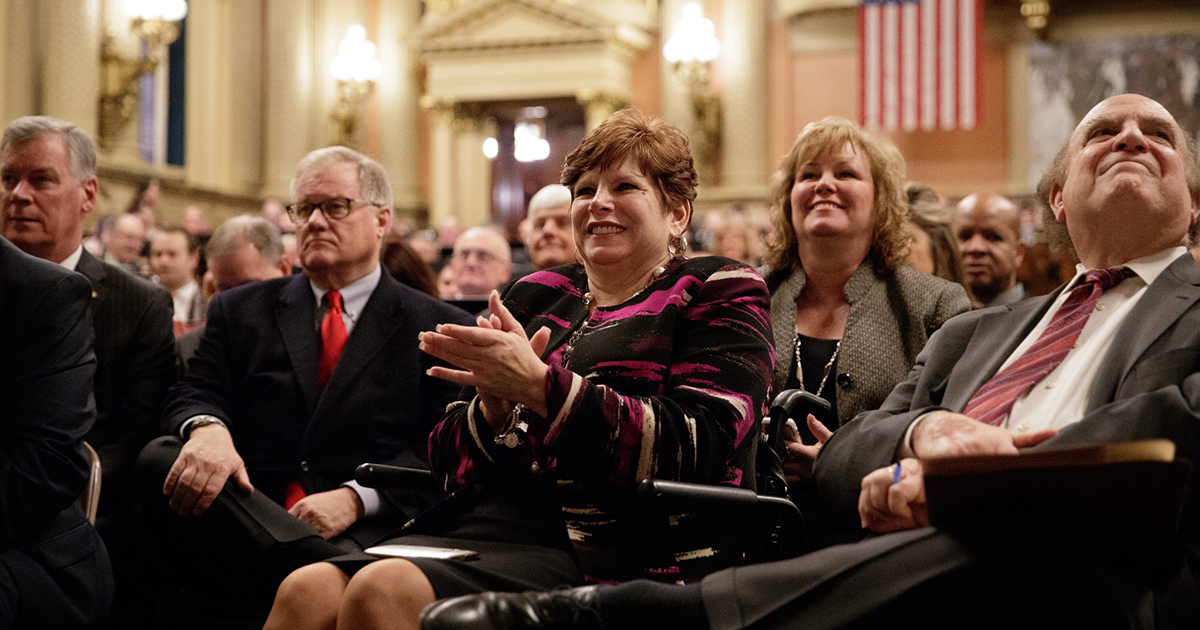
Tartaglione Applauds Governor’s Workforce Development, Minimum Wage Advocacy in 2019 Budget Plan
HARRISBURG, PA, Febrero 6, 2018 – Sen. Christine Tartaglione applauded Gov. Tom Wolf’s commitment of $100 million toward workforce development programs as well as his support for raising Pennsylvania’s minimum wage in the Fiscal 2019 budget proposal that the governor delivered today to a joint session of the General Assembly.
Tartaglione is further encouraged by the governor’s intention to close the Delaware corporate tax loophole; his plan to expand access to substance abuse treatment and prevention; his renewed effort to require municipalities that rely exclusively on Pennsylvania State Police to pay for those services; as well as his call for more state investment in home- and community-based services for people with intellectual disabilities and autism spectrum disorders.
“I’m glad that Governor Wolf shares my conviction that Pennsylvania must improve its economic competitiveness by developing our workforce with programs like education and training, apprenticeships and industry partnerships, as well as mandating that employers pay workers fair, living wages.
“Just yesterday, I announced my sponsorship of Senate Bill 1044 to raise Pennsylvania’s minimum wage from $7.25 an hour to $15 over the next six years. We haven’t raised our minimum wage since 2006. All of Pennsylvania’s neighboring states and 28 states across the country have a higher minimum wage than we do. Raising the minimum wage will make Pennsylvania a more attractive place for workers to raise their families and will improve the economy by putting more money in the hands of consumers.”
During his budget address and in a more-detailed overview of his plan distributed through the Office of the Budget, Wolf proposed raising the minimum wage from $7.25 an hour to $12 this year.
Wolf also outlined a $50 million investment to improve access for Pennsylvania students and workers to education, training and career readiness programs; and $25 million to grow STEM and computer science-related education in K-12 and postsecondary programs. The budget plan further invests $7 million in apprenticeship and work-based training, along with $3 million for partnerships between employers and public workforce providers.
“These are issues that I’ve been attempting to advance for quite some time,” Sen. Tartaglione said.
Similarly, Sen. Tartaglione supports the governor’s renewed effort to close the “Delaware loophole.” That’s the law allowing Pennsylvania-based corporations to establish holding companies in neighboring Delaware, where their profits are not subject to a corporate income tax.
“For all intents and purposes, these corporations are Pennsylvania-based. They occupy land here and do business here. They should be paying their fair share of corporate taxes to support the infrastructure and services that enable them to succeed here.”
Requiring municipalities to pay for local State Police coverage is another Wolf proposal that would have a positive impact on Pennsylvania’s fiscal outlook, according to Sen. Tartaglione. The senator further supports the governor’s plan to allocate an additional $74 million to services for people with intellectual disabilities and autism, including $16 million to provide 965 people with supports and services enabling them to keep living in their homes and communities after they reach age 21 and no longer qualify for the special education system.
In the ongoing fight against substance abuse, specifically opioid use disorder, the governor plans to leverage $26.5 million in federal funding to supplement the state’s existing efforts to expand and sustain access to treatment services. Wolf also proposes a $4.5 million state allocation for training home-treatment providers and another $2 million to expand accredited drug treatment courts.
“Opioid addiction and opioid-related deaths have risen to catastrophic levels and are a public health crisis,” Sen. Tartaglione said. “We must commit significant resources strategically and thoughtfully in response to this emergency.”
# # #
Si desea más información sobre este tema, póngase en contacto con William Kenny en el 215-533-0440 o por correo electrónico en [email protected].
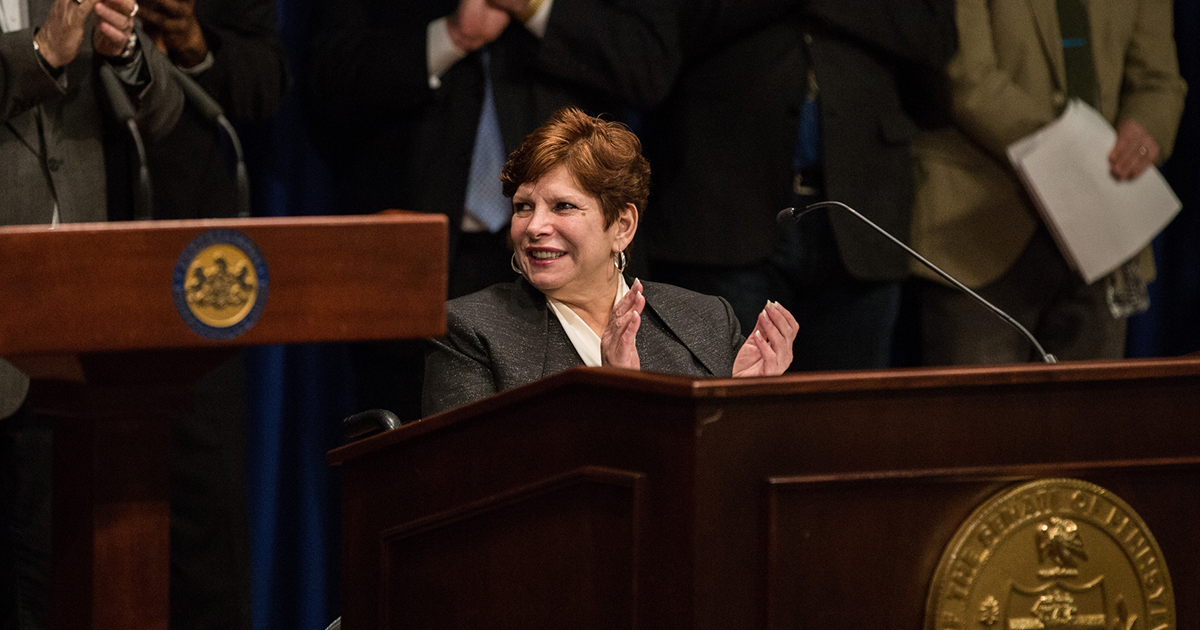
Senator Tartaglione Introduces Legislation to Raise Pennsylvania’s Minimum Wage
Lawmakers and workers’ advocates renewed the call for fair, family-sustaining wages
HARRISBURG, PA, Febrero 5, 2018 – State Sen. Christine Tartaglione today announced recently introduced legislation that proposes to raise Pennsylvania’s long-stagnant minimum wage. Surrounded by colleagues in the General Assembly, other workers’ advocates and members of Raise the Wage PA, Tartaglione announced the details of Senate Bill 1044 that would impact millions of low-wage Pennsylvanians.
“For far too long, many Pennsylvanians have had to manage with far too little,” Senator Tartaglione said. “Regrettably, Pennsylvania hasn’t raised its minimum wage since 2006 and the federal government hasn’t raised the minimum wage since 2009. That is why we are here today, to advocate again for raising the minimum wage.”
Senator Tartaglione has been at the forefront of the minimum wage issue throughout her 24 years in the Senate. She negotiated Pennsylvania’s last minimum wage increase in 2006. But since then, Pennsylvania has fallen behind the times. All six of its neighbor states have minimum wages above the $7.25 federal level, as do 28 states across the country. But Pennsylvania does not.
Similarly, tipped workers in Pennsylvania have gone without a raise in the minimum wage since 1998. They are entitled to just $2.83 an hour under the law.
“Under the current minimum wage, a worker who logs 40 hours a week makes just about $15,000 a year,” Senator Tartaglione said. “That’s below the federal poverty level for a two-person household. And in Pennsylvania, it qualifies the worker to collect Food Stamps. And that is unacceptable.”
Tartaglione’s Senate bill is a companion bill to similar legislation introduced in the Pennsylvania House by Rep. Patty Kim. Under the bill, the minimum wage would rise to $12 an hour immediately ($9 for tipped workers), then increase incrementally to $15 in 2024 ($12 for tipped workers). After 2024, the minimum wage would increase automatically each year based on a cost-of-living adjustment.
The senator noted that the cost of living has risen dramatically since the last time Pennsylvania raised its minimum wage. The cost of a loaf of bread has risen from 97 cents to about $2.50. A gallon of milk has risen from about $3.25 to over $4. A dozen eggs have risen from about one dollar to $2.65.
“The minimum wage isn’t about giving a handout. It’s about giving a hand up,” Senator Tartaglione said.
Sen. Art Haywood, a co-sponsor of SB 1044, joined Senator Tartaglione at today’s news conference in the Capitol. Haywood is the primary sponsor of SB 1045, which would add onto Tartaglione’s legislation by gradually increasing the tipped minimum wage to match the non-tipped minimum wage over three years starting in 2025. Haywood’s bill, which was co-sponsored by Tartaglione, would also eliminate a provision in state law that prevents municipalities from raising their local minimum wages above the state minimum.
Senate Majority Leader Jay Costa, John Meyerson of Raise the Wage PA, The Rev. Sandra L. Strauss of the Pennsylvania Council of Churches, Mark Price of Keystone Research Center and John Traynor, owner of the Harrisburg Midtown Arts Center, also joined Senator Tartaglione for today’s announcement.
# # #
Si desea más información sobre este tema, póngase en contacto con William Kenny en el 215-533-0440 o por correo electrónico en [email protected].
Senator Tartaglione Introduces SB-1044 – Raise the Minimum Wage Press Conference
Job Training, Minimum Wage Boost, Education Key Parts of Budget Proposal, Tartaglione says
Harrisburg – Febrero 7, 2017 – Senate Democratic Labor and Industry chair Sen. Christine M. Tartaglione (D-Philadelphia) offered comments about the proposed $32.3 billion 2017-18 Fiscal Year budget that Gov. Tom Wolf unveiled today before a joint session of the General Assembly.
The plan increases spending slightly over last year, but cuts $2 billion in costs. It would close the $3 billion budget deficit with efficiencies and government reform, but without new broad-based taxes.
Tartaglione said she was particularly pleased with several aspects of the proposed budget including a new job training apprenticeship grant program; the call to increase the minimum wage to $12 per hour; and a renewed effort to close the so-called Delaware corporate tax loophole. Each of these initiatives have been a focus for Tartaglione over a number of sessions.
Tartaglione’s reaction to the spending plan follows:
“The governor has offered a responsible plan that not only deals with the looming budget deficit but makes key investments in job training, job creation, education and social service programs. The budget proposal includes a number of initiatives that I have been involved with including an expansion of apprenticeships to help create jobs, an increase the minimum wage and the closing of the Delaware Loophole.
“Lawmakers face a number of challenges to closing the budget deficit, but the governor has generated an alternative proposal that involves government reforms, efficiencies and structural changes. We have to be very mindful that our state budget invests in programs and services that help working men and women, children, students, seniors and those in need.
“This is a good starting point and one that can help jump-start dialogue leading to an on-time budget that meets the needs of Pennsylvania.”
-30-
Tartaglione presentará una ley de aumento del salario mínimo
Harrisburg - 3 de febrero de 2017 - La senadora estatal Christine M. Tartaglione (D-Phila.) anunció hoy que presentará una legislación para aumentar gradualmente el salario mínimo a $ 15 para 2021.
"Un aumento del salario mínimo está justificado moralmente y tiene sentido económicamente", dijo Tartaglione. "Es inconcebible que alguien que trabaje 40 horas semanales completas con el salario mínimo actual esté en peligro económico".
Según la propuesta (Proyecto de Ley del Senado 12), el salario mínimo actual de 7,25 dólares aumentaría a 12 dólares el 1 de julio de 2017 y subiría progresivamente hasta alcanzar los 15 dólares en 2021. Se aplicaría entonces un índice de inflación para eliminar la necesidad de cualquier futura acción legislativa sobre el tema.
Tartaglione lleva mucho tiempo defendiendo el aumento salarial. Contribuyó decisivamente a aprobar la última subida en 2006. Argumentando que los trabajadores merecen un trato más justo, ha presentado proyectos de ley en las últimas sesiones legislativas para aumentar la tasa.
"Hay pocas cosas que los legisladores puedan hacer que tengan un impacto tan directo en las familias trabajadoras como el aumento del salario mínimo", dijo Tartaglione. "La Asamblea General no ha actuado - y los hombres y mujeres trabajadores han sufrido".
Pensilvania subió el salario mínimo por última vez en 2006. El gobierno federal lo elevó a los 7,25 dólares por hora actuales en 2009. Treinta y un estados, cinco de los cuales rodean Pensilvania, tienen salarios mínimos superiores al federal. Diecinueve estados han aprobado leyes que vinculan los aumentos del salario mínimo a la inflación.
En Pensilvania hay aproximadamente 87.000 trabajadores con salario mínimo. Un trabajador con salario mínimo que trabaje 40 horas semanales durante 52 semanas sólo gana 15.090 dólares al año. El índice de pobreza para una familia de dos miembros es de 14.570 dólares al año.
"Tenemos que asegurarnos de que el salario se eleva a una tasa que saque a los trabajadores y a las familias trabajadoras de la pobreza", afirmó Tartaglione. "Necesitamos un fuerte apoyo legislativo para un aumento robusto que compense su pérdida de valor desde la última vez que se subió el salario mínimo".
Según el Keystone Research Center, si el salario mínimo se hubiera incrementado con la inflación, hoy sería de 11 dólares por hora. Un aumento del salario mínimo sacaría a 1. 2 millones de habitantes de Pensilvania de la pobreza.
Tartaglione dijo que su legislación daría a los municipios la opción de fijar un salario mínimo más alto. La medida también reforzaría los requisitos para que los empresarios lleven registros precisos que garanticen que pagan el salario correcto a los trabajadores.
La representante estatal Patty Kim (D-Dauphin) ha presentado una propuesta similar de aumento del salario mínimo en la Cámara de Representantes estatal.
-30-
$10.10 Minimum Wage a Revenue Generator for Commonwealth, Sen. Tartaglione Says During Capitol Rally
HARRISBURG, Feb. 10, 2016 – As state budget negotiators struggle to find new sources of revenue, Sen. Christine Tartaglione told a Capitol rally today that a $10.10 minimum wage would generate millions in new state income and save the commonwealth millions more.
“Paying people a fair wage of not less than $10.10 per hour reaps huge benefits for this commonwealth and all of the families who live here,” Tartaglione, the state’s leading minimum wage advocate in the General Assembly, said. “It’s a very common-sense approach to a very large and expanding problem we face here in Harrisburg.
“There would be a $121.5 million increase in state income and sales taxes and a shift of $104 million in Medicaid payments from the state to the federal government
“These changes would go a long way in a budget environment like ours.”
The Philadelphia Democrat proposed Senate Bill 195 this session to increase Pennsylvania’s minimum wage from $7.25 to $10.10. Her Senate Bill 196 would raise the tipped minimum wage to 70 percent of the regular rate.
“It’s long past time that Pennsylvania raises its minimum wage to compete with all of our surrounding states,” Sen. Tartaglione said during the Raise The Wage PA-organized rally. “The time is now to enact this common sense legislation.”
###
Siga a la senadora Christine Tartaglione en Facebook, Twitter y a través de su sitio web.
Sen. Tartaglione Pleased with Governor’s Call for $10.15 Minimum Wage in PA
HARRISBURG, Feb. 9, 2016 – Despite the financial challenges facing Pennsylvania due to Republican intransigence, the commonwealth’s leading advocate for a fairer minimum wage said she is pleased that Gov. Tom Wolf is calling for a $10.15 base hourly rate.
“The tunnel vision that has led Pennsylvania to a fiscal cliff has also prevented our frontline workers from receiving a pay raise for the past seven years,” Sen. Christine Tartaglione said following the governor’s annual budget address today.
“But $10.15 an hour is the best indication that our fight for a fair minimum wage will continue in earnest.”
Sen. Tartaglione led the charge to get Pennsylvania’s minimum wage to $7.15 an hour in 2006. The state’s base hourly pay rate ticked up to its current level, $7.25 an hour, when the federal government approved that wage in 2009.
The Philadelphia Democrat’s current legislation, Senate Bill 195, move Pennsylvania’s minimum wage from $7.25 to $10.10. Her Senate Bill 196 would hike the tipped minimum wage to 70 percent of the regular rate (or $3.95 an hour, based on a $10.10 minimum wage).
“More than a million workers will get a pay raise, countless employers will have more focused employees, and government subsidies will fall when the Republican leadership gets out of the way and finally allows a vote on proposals to increase the minimum wage,” Tartaglione said. “These increases are overdue. We must make this a priority.”
###
Siga a la senadora Christine Tartaglione en Facebook, Twitter y a través de su sitio web.
Contacto: Mark Shade
